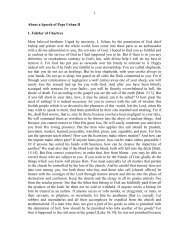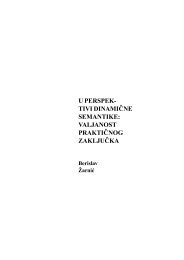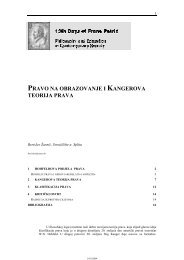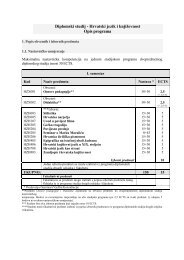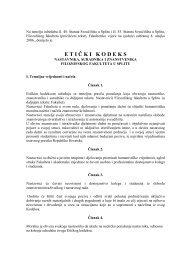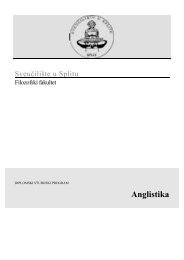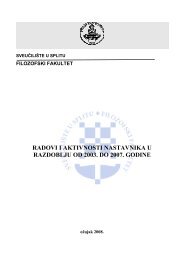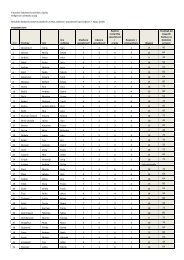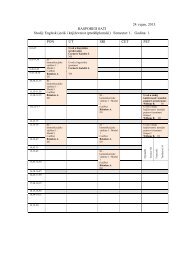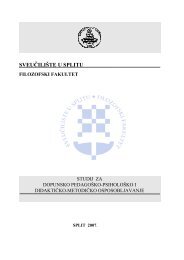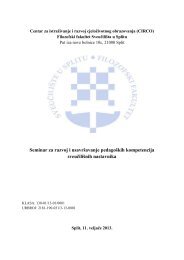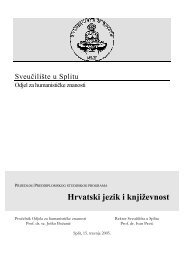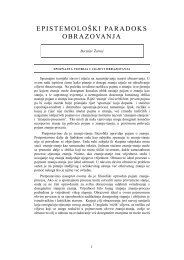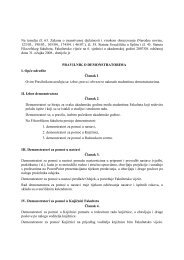English Studies
English Studies
English Studies
You also want an ePaper? Increase the reach of your titles
YUMPU automatically turns print PDFs into web optimized ePapers that Google loves.
G R A D U A T E D E G R E E P R O G R A M M E : E N G L I S H S T U D I E S<br />
Prerequisites<br />
Course contents<br />
Recommended<br />
reading<br />
Supplementary<br />
reading<br />
future researchers of language and discourse to develop critical and<br />
analytical competences, as well as in educating competent teachers and<br />
translators.<br />
Knowledge and competences acquired by completing the undergraduate<br />
study programme <strong>English</strong> language and literature or an equivalent study<br />
programme.<br />
Literary (and non-literary) texts, their conceptual underpinnings as well as<br />
their aesthetic and cultural structures are analysed with an emphasis on<br />
textual and historical detail and the interplay of writing and reading<br />
conventions in the process of activating text into discourse.<br />
The introductory parts of the course deal with the basic techniques and<br />
problem solving in studying texts (asking questions, analysing units of<br />
structure) and the dimensions of language variation (according to time,<br />
place, context, gender, society) that provide the communicative background<br />
to a specific text. Two of the main parts focus on analysing poetic form<br />
(rhyme and sound patterning, verse and metre, parallelism, deviation) and<br />
on ways of making meaning indirectly (metaphor, irony, juxtaposition,<br />
allusion and intertextuality). The other two are concerned with what makes<br />
a story and how stories are told (genre, narrative, writing, speech and<br />
thought presentation, narrative point of view) and with questions of<br />
authorship and audience (positioning the reader or spectator, authorship and<br />
intention, judgement and value).<br />
Attridge, D. (2004). The Singularity of Literature. London & New York:<br />
Routledge.<br />
Montgomery, M., Fabb, N., Furniss, T., Mills, S., Durant, A. (2000).<br />
Ways of Reading: Advanced Reading Skills for Students of <strong>English</strong><br />
Literature (2 nd edn.). London & New York: Routledge.<br />
Hall, G. (2005). Literature in Language Education. Basingstoke: Palgrave<br />
Macmillan.<br />
Toolan, M. (2001). Narrative: A Critical Linguistic Introduction (2 nd edn.).<br />
London & New York: Routledge.<br />
Wainwright, J. (2004). Poetry: The Basics. London & New York:<br />
Routledge.<br />
Teacher-generated materials.<br />
1. Teacher-generated materials<br />
2. Selected chapters from:<br />
Bonačić, M. (1999). Tekst, diskurs, prijevod. Split: Književni krug.<br />
Cook, G. (1994). Discourse and Literature. Oxford: Oxford University<br />
Press.<br />
Green, K. & Bihan, J. (1996). Critical Theory and Practice: A Coursebook.<br />
London: Routledge.<br />
Lecercle, J. J. (1999). Interpretation as Pragmatics. Houndmills,<br />
Basingstoke, Hampshire and London: Macmillan Press Ltd.<br />
Scholes, R. (1985). Textual Power: Literary Theory and the Teaching of<br />
<strong>English</strong>. New Haven – London: Yale University Press.<br />
19



